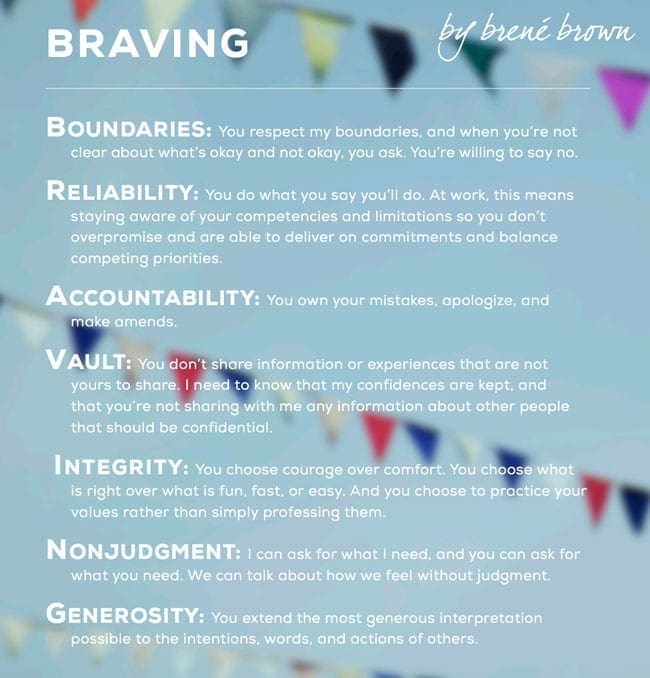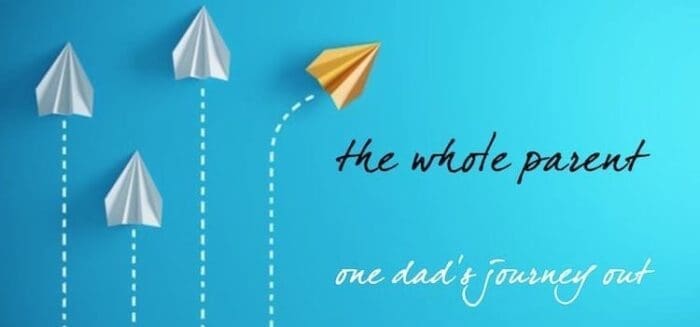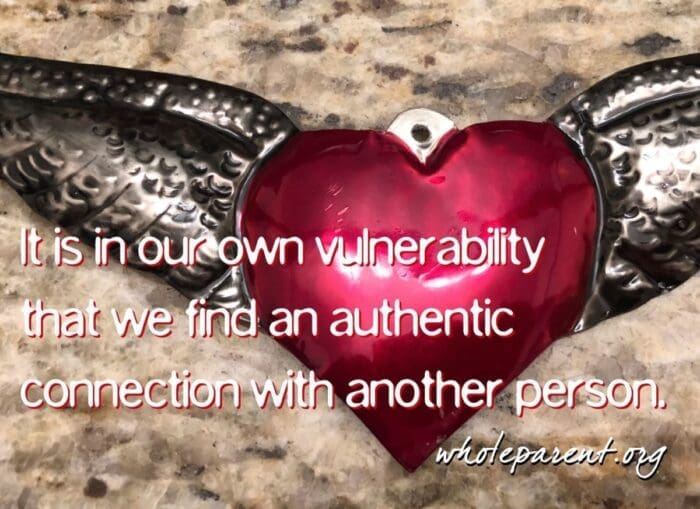It’s in our own vulnerability that we find an
authentic connection with another person.
If you are going to love deeply, you become more susceptible to fear. The more we come to depend on the reciprocal affection of another person the more put ourselves at risk of a painful loss should the relationship not work out. Even in our everyday relationships, caring deeply about someone comes with risks.
In long-term relationships the more you dive in and allow yourself to be submerged and merged, the more depth adds to the vulnerability. And it’s in our own vulnerability that we find the authentic connection with another person. In your romantic relationship, you want to be able to tell them anything. Sharing the hard things is difficult at first, but as time goes along and you experience some successful joins around a hard moment, your trust goes up, and the relationship deepens. And, you become more dependent on the other person for that support, reflection, and empathy. That’s where we are going: towards 100% authentic empathy.
BRAVING
Brené Brown has given us a framework for exploring this vulnerability and authentic connection in her BRAVING process. Here’s the short version.

Let’s take a quick look at how this applies to feeling the fear as a relationship deepens and you become more attached and thus more dependant on your lover.
In most of my experience in relationships, I’m the one holding the space for the other person to feel their feelings of fear and anxiety related to some previous relationship trauma. I call it going meta, where I imagine myself floating above the situation and observe both of us as if looking down on a scene in a movie. As the other person is expressing their pain and trauma it’s important to just hold a loving space for them. My issue is when I want to rush in with a solution. In BRAVING we don’t offer to fix the other person. We simply allow them to feel our love and attention. Our support comes in the form of steadfast loyalty.
Embracing Vulnerability in Ourselves
Recently, however, I’ve been on the vulnerable side of the process. Yesterday, I was reading a statement about my new podcast (Love on the Air) to my producer and I began to get overwhelmed by the feelings behind what I’d written. Just sharing this experience with my friend and having her offer her comfort but not advice, was amazing. I am writing about a difficult time in my life. I’m expressing my sadness at how much of my two kids’ lives I’ve missed due to the 70/30 split I was handed by my ex-wife and the state of Texas. “I miss my kids every day of my life,” I say, and there they are, the overwhelming feelings of sadness. I pause.
“It’s okay,” my friend says.
I am happy to have the feelings come up. I am happy to be seen (even over the telephone) by a friend. When we share our pain with another person and they listen and accept the role of loving supporter, a transformation of the pain takes place. With each telling to an empathetic listener unpeels a layer of the shame and sadness that could be lingering underneath our tough and capable facade. Even when I am strong and driven in my progress towards my dreams, I am still a child underneath. This child still has hurts. This child still suffers in silence in a darkened room, alone. But each time I give that inner-child a chance to come out and be heard by another person, I bring a little more light into their isolation room. As children, we didn’t know how to process or heal from our traumas and disappointments. Even as adults we don’t do very good at processing pain and sadness.
In love relationships, the complications are even more difficult to overcome. In these cases, expressing our vulnerability can be terrifying. What if our partner rejects us? What if they get angry? And if the issue is around something in the relationship… Well, most of us have difficulting broaching hard subjects with a lover. (Your inner voice asks, “Can’t we just skip over this one and watch a movie or something?”) And so we often suffer along, not getting our needs met, not being vulnerable and open, not expressing our full selves.
Each of us holds on to a lot of baggage from our past relationships when things did not work out. It could be around sex. It could be around unfaithfulness. It could be around money. If you are parents, it could be around kid discipline or chores. And in relationships, this baggage is going to raise its ugly head. When it does there is a simple process for capturing the triggered emotions before they inflict damage on yourself or your partner. The process is a simplified subset of BRAVING.
Healthy Boundaries in Relationships
First, we establish healthy boundaries. What’s yours is yours and what’s mine is mine. What traumas you bring into the relationship are yours and cannot be fixed by me. They can only be processed by you. In this healthy scenario, I cannot fix you. I am not responsible for your emotional health and ability to process difficult things on your own. And I will be here for you, beside you, while you go through this.
I Am Here, I Am Not Afraid, I Am Not Leaving
Often, just having a person there to hold our hand and look into our eyes as we experience something painful is quite healing. They don’t have to say anything. In fact, saying stuff can often interrupt the feeling person’s experience of discharge. They need to feel these feelings. They need to have an empathetic and safe listener. And then need to own their own pain and the steps necessary to process the trauma and recover their authentic, amazing selves. You are amazing and vibrant. The shames and skeletons in your closet are dampening your vibrancy. When feelings come up in life, and you have a safe partner to process with, it is helpful to open your scared and tender heart to them, to share your pain with another person.
No Judgement and No Responsibility to Offer Solutions
Part of being a good empathetic listener (as a partner or a friend) is to allow the other person’s upset to come out and not offer any opinions or judgment about the crisis. (For example, a friend shared her distress about falling in love with someone who was already married. I could’ve been bummed out about that aspect of the crisis, but instead, I focused on my friend. In the moment, I said, “I support your beautiful self and appreciate you trusting me with this difficult information. I don’t judge you. I understand.”
And then the next step for me was to give up the role of advisor. It’s clear from this short conversation that I don’t know much about what’s going on in her life. I know nothing about this married person’s life. I have only my friend, expressing her dismay and sadness. And most of us would want to offer our opinion or advice in this situation, but that is exactly what they don’t need. DON’T OFFER UNSOLICITED ADVICE. EVER!
So, I don’t judge this person. And then I don’t try and fix them either. I simply embrace them where they are, giving them the love and support to feel what’s going on for them.
Today I Still Feel Loneliness, and It Is Mine
Even navigating a wonderful loving relationship we’re going to have moments of loneliness and sadness. As I head towards a few nights alone, again, I can feel that dread of being “alone.” I am aware that my vulnerable heart is afraid of being left (again) by someone who loves me. This sadness and fear is mine. It’s not about my relationship. It’s about my own inner loneliness and fear. As I learn to embrace all parts of myself, I can notice the small boy inside my heart.
My small John is afraid of being hurt again. My small John does not want to be alone for even a single night. My small John wants to be comforted and held 24-hours a day. And of course, my big John knows that this is not feasible. I can hold the space for my sadness at being left alone as a young boy. I can embrace my pain at being alone tonight, after a wonderful weekend in partnership. And I can reassure small John that this pain is old pain and can be processed and released into the heavens. And today, by design, I have just the place to go release my tears about being left alone as a small boy.
Our tears and fears are our own. Partners can support us, but they cannot fix us. Partners can hold us, but they can’t heal us. The healing must come from within ourselves. The love we desire must come from our own acceptance and self-love. If we’ve room or desire for God in there, we can let that spiritual support guide us through as well.
We Are Alone, and We Are Not Ever Alone
I don’t know what the future holds for my relationship or my plans for building a living community around this “single parent” work. And as I experienced a little over a year ago, when we head down the hospital hallway into the operating room, we are absolutely alone with ourselves and our prayers.
I am alone at the moment. I am basking in the love that I am feeling. I am feeling love for my partner. I am feeling love for little John and his pain. And I am celebrating the BIG love that I am part of, and all the joy flowing through my life AT THIS VERY MOMENT, even as I touch the inner sadness I still carry.
And…
I am not alone.
You are not alone.
We are never alone if we have a higher power to hold us in our moments of pain and loneliness.
Namasté,
John McElhenney – life coach austin texas
Facebook | Instagram | Pinterest | @wholeparent
Related posts:
- Self-Care and Appreciation: Can I Love All of Myself Right Now?
- 3 Required Traits for Building a Lasting Relationship
- Emotional Intelligence Essentials for Long-Term Relationship Success
- Pausing in the Gap: Trying to Force An Answer Is Not the Way
You can find all of my books on AMAZON.




